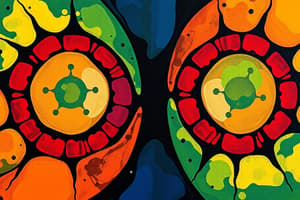Podcast
Questions and Answers
What is the 'cell cycle'?
What is the 'cell cycle'?
A regulated process in which cells divide to produce two genetically identical daughter cells for growth, repair, and asexual reproduction.
Why does mitosis not provide any genetic variation?
Why does mitosis not provide any genetic variation?
Because all the cells produced by mitosis are genetically identical.
What are the three stages of the cell cycle?
What are the three stages of the cell cycle?
Interphase, mitosis, cytokinesis.
What occurs during the interphase part of the cell cycle?
What occurs during the interphase part of the cell cycle?
What occurs during the mitosis part of the cell cycle?
What occurs during the mitosis part of the cell cycle?
What occurs during the cytokinesis part of the cell cycle?
What occurs during the cytokinesis part of the cell cycle?
What are the four stages of mitosis?
What are the four stages of mitosis?
What cycle does the cell go through when it divides?
What cycle does the cell go through when it divides?
How long could it potentially take for a cell to divide? Explain why.
How long could it potentially take for a cell to divide? Explain why.
What are the three phases which interphase consists of?
What are the three phases which interphase consists of?
What occurs during the G1 phase of the cell cycle?
What occurs during the G1 phase of the cell cycle?
What occurs during the S phase of the cell cycle?
What occurs during the S phase of the cell cycle?
What occurs during the G2 phase of the cell cycle?
What occurs during the G2 phase of the cell cycle?
What controls the timing of each stage at which the cell cycle occurs?
What controls the timing of each stage at which the cell cycle occurs?
What do cyclins bind to?
What do cyclins bind to?
What is the process which occurs after cyclins bind to cyclin-dependent kinases?
What is the process which occurs after cyclins bind to cyclin-dependent kinases?
What are the four main types of cyclins in human cells?
What are the four main types of cyclins in human cells?
What must the four main types of cyclin in human cells reach, in order to progress to the next stage of the human cycle?
What must the four main types of cyclin in human cells reach, in order to progress to the next stage of the human cycle?
How does cytokinesis occur in animal cells?
How does cytokinesis occur in animal cells?
How does cytokinesis occur in plant cells?
How does cytokinesis occur in plant cells?
What are the number of places at which control in the cell cycle happens?
What are the number of places at which control in the cell cycle happens?
What do the complexes from when the cyclins build up and bind to cyclin-dependent kinases bring about?
What do the complexes from when the cyclins build up and bind to cyclin-dependent kinases bring about?
What must all of the DNA in a cell carry out before the cell divides?
What must all of the DNA in a cell carry out before the cell divides?
Why must all of the DNA in a cell duplicate before the cell divides?
Why must all of the DNA in a cell duplicate before the cell divides?
Why must the DNA become more organized and easier to move around the cell for cell division?
Why must the DNA become more organized and easier to move around the cell for cell division?
What is chromatin organized into?
What is chromatin organized into?
What is the process in which chromosomes are formed?
What is the process in which chromosomes are formed?
Flashcards are hidden until you start studying
Study Notes
The Cell Cycle
- The cell cycle is a regulated process allowing cells to divide and produce two genetically identical daughter cells for growth, repair, and asexual reproduction.
- Mitosis does not provide genetic variation because it generates genetically identical cells.
- The cell cycle consists of three main stages: interphase, mitosis, and cytokinesis.
Interphase
- Interphase involves cell growth, DNA replication, and preparation for cell division. Chromosomes condense to form chromatin.
- Interphase is further divided into three phases:
- G1 Phase: The cell grows, develops, performs normal processes, synthesizes proteins for division, and produces ATP.
- S Phase: Genetic material is copied; chromosomes replicate into double-stranded chromatids.
- G2 Phase: The cell produces more cytoplasm, duplicates organelles, and checks DNA for errors.
Mitosis
- Mitosis is the phase where the nucleus divides, resulting in daughter cells each with identical genetic material.
- There are four stages in mitosis: prophase, metaphase, anaphase, and telophase.
Cytokinesis
- Cytokinesis involves dividing the cytoplasm to produce two separate daughter cells.
- In animal cells, a contractile ring tightens to separate the cells.
- In plant cells, a cell plate forms across the center, with cellulose deposited to create new cell walls.
Control of the Cell Cycle
- Timing of the cell cycle stages is regulated by proteins called cyclins.
- Cyclins bind to cyclin-dependent kinases (CDKs), activating them to facilitate progress through the cell cycle.
- Four major types of cyclins in human cells are cyclin A, B, D, and E, which must reach a threshold concentration to transition between stages.
Checkpoints and DNA Replication
- Checkpoints throughout the cell cycle act as control mechanisms, ensuring proper progression.
- Before division, all DNA must duplicate to ensure each daughter cell receives a complete copy.
- The DNA must organize from a disorganized state, known as chromatin, into structures called chromosomes for effective movement during cell division.
Chromatin and Chromosomes
- Chromatin consists of DNA wound around proteins called histones, forming nucleosomes, which then supercoil to create chromosomes.
Studying That Suits You
Use AI to generate personalized quizzes and flashcards to suit your learning preferences.




